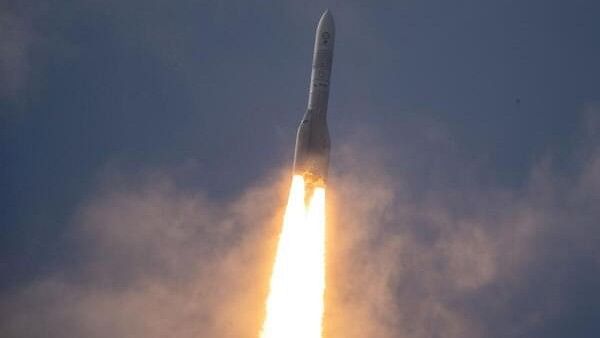
FILE PHOTO: Europe's Ariane 6 rocket takes off, in Kourou, French Guiana.
Credit: Reuters File Photo
Paris: Space launch provider Arianespace on Monday reaffirmed plans to stage the second mission of Europe's Ariane 6 launcher before the end of the year after a glitch that marred the inaugural launch was traced to an "easily fixable" software fault.
Following lengthy delays, Europe's newest uncrewed rocket blasted off on July 9 and successfully carried out a series of trials. But the mission ended with the launcher coasting in orbit without releasing its final batch of payloads.
Arianespace CEO Stephane Israel said the failure to stage a third firing of the upper-stage Vinci engine, which resulted in the final deployments being curtailed, had been traced to a software flaw that would be repaired before the next launch.
In a separate statement, a task force of government agencies and companies overseeing the introduction of Ariane 6, including the European Space Agency and Arianespace parent ArianeGroup, said there were "no showstoppers" to the next flight.
Ariane 6 was developed at an estimated cost of 4 billion euros ($4.33 billion) by ArianeGroup, which is co-owned by Airbus and Safran, in the face of competition from Elon Musk's SpaceX which now dominates the launch market.
Israel was speaking to reporters on the sidelines of World Space Business Week, a major annual satellite conference.
He reiterated calls for flagship European satellite programmes such as the European Commission's 6-billion-euro IRIS² project to be launched on European rockets.
A number of key European payloads including a satellite for weather agency Eumetsat switched to rival SpaceX's Falcon 9 during a gap in European capability caused in part by delays to Ariane 6, to the frustration of European space officials.
"We will be fully available for IRIS² when it comes," Israel said.
The European Union was not immediately available for comment on whether it would compete launch contracts for IRIS², an array of up to 170 satellites designed to secure communications for EU governments and open new commercial broadband services.
Ariane 6 owes its existence to a decision by ESA's 22 nations in 2014 to develop a family of rockets in the face of competition from Musk's private space venture.
The European Space Agency last year launched an initiative to boost small-launcher projects that could pave the way for a future private player for the next generation.
Arianespace's Israel, however, said there would not be room for more than one provider of heavy launchers in Europe.